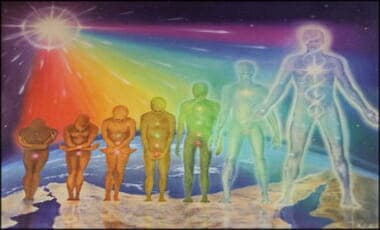I wish to illustrate with a conversation (unfinished by the way) between myself and a Zen Buddhist. This conversation can almost happen with any religious Hindu, Buddhist, Taoist, or the like. The conversation takes place after an interesting post by the person on his blog about self-defense, the Dalai Lama, WWII, and the Buddha. I will post my reply to his original thought, and then he responds, followed again by me. (Keep in mind I am using our “blog” names, they are almost like “handles” like in the movie Top Gun):[42]
MY INITIAL ENGAGEMENT:
Does the idea of “violence” as a moral good or a moral evil truly exist in the Buddhist mindset? What I mean is that according to a major school of Buddhism, isn’t there a denial that distinctions exist in reality… that separate “selves” is really a false perception? Language is considered something the Buddhist must get beyond because it serves as a tool that creates and makes these apparently illusory distinctions more grounded, or rooted in “our” psyche. For instance, the statement that “all statements are empty of meaning,” would almost be self refuting, because, that statement — then — would be meaningless. So how can one go from that teaching inherent to Buddhistic thought and say that self-defense (and using WWII as an example) is really meaningful. Isn’t the [Dalai] Lama drawing distinction by assuming the reality of Aristotelian logic in his responses to questions? (He used at least three Laws of Logic [thus, drawing distinctions using Western principles]: The Law of Contradiction; the Law of Excluded Middle; and the Law of Identity.) Curious.
THEY CALL HIM JAMES URE, RESPONDS:
You’re right that language is just a tool and in the end a useless one at that but It’s important to be able run a blog. That or teach people the particulars of the religion. It’s like a lamp needed to make your way through the dark until you reach the lighthouse (Enlightenment, Nirvana, etc.) Then of course the lamp is no longer useful unless you have taken the vow to teach others. Which in my analogy is returning into the dark to bring your brothers and sisters along (via the lamp-i.e. language) to the lighthouse (enlightenment, Nirvana, etc.)
I RESPOND:
Then… if reality is ultimately characterless and distinctionless, then the distinction between being enlightened and unenlightened is ultimately an illusion and reality is ultimately unreal. Whom is doing the leading? Leading to what? These still are distinctions being made, that is: “between knowing you are enlightened and not knowing you are enlightened.” In the Diamond Sutra, ultimately, the Bodhisattva loves no one, since no one exists and the Bodhisattva knows this:
“All beings must I lead to Nirvana, into the Realm of Nirvana which leaves nothing behind; and yet, after beings have been led to Nirvana, no being at all has been led to Nirvana. And why? If in a Bodhisattva[43] the notion of a “being” should take place, he could not be called a “Bodhi-being.” And likewise if the notion of a soul, or a person should take place in him.
So even the act of loving others, therefore, is inconsistent with what is taught in the Buddhistic worldview, because there is “no one to love.” This is shown quite well (this self-refuting aspect of Buddhism) in the book, The Lotus and the Cross: Jesus Talks with Buddha. A book I recommend with love, from a worldview that can use the word love well. One writer puts it thusly: “When human existence is blown out, nothing real disappears because life itself is an illusion. Nirvana is neither a re-absorption into an eternal Ultimate Reality, nor the annihilation of a self, because there is no self to annihilate. It is rather an annihilation of the illusion of an existing self. Nirvana is a state of supreme bliss and freedom without any subject left to experience it.”
MY FINAL RESPONSE
I haven’t seen a response yet. Which is fitting… because whom would be responding to whom? Put another way, would there be one mind trying to actively convince the other mind that no minds exist at all?
Here’s another way to see the same thing, Dan Story weighs in again:
It may be possible that nothing exists. However, it is impossible to demonstrate that nothing exists because to do so would be to deny our own existence. We must exist in order to affirm that reality doesn’t exist. To claim that reality is an illusion is logically impossible because it also requires claiming that the claim itself is unreal—a self-defeating statement. If reality is an illusion, how do we know that pantheism isn’t an illusion too?[44]
Another author put it thusly, “if pantheism is true (and my individuality an illusion), it is false, since there is no basis by which to explain the illusion.”[45][46] You see… The challenge then becomes this: “if reality is an illusion, how do we know then that pantheism isn’t an illusion as well?”
… most people assume that something exists. There may be someone, perhaps, who believes that nothing exists, but who would that person be? …. no one ever consciously tries to defend the position that nothing exists. It would be a useless endeavor since there would be no one to convince. Even more significantly, it would be impossible to defend that position since, if it were true, there would be no one to make the defense. So to defend the position that nothing exists seems immediately to be absurd and self-contradictory.[47]
Another problem in pantheism is God’s inability to deal with or solve the problem of evil.[48] Dan Story points out what should be becoming obvious, “He is the cause of it (remember, all is God).” Mr. Story continues:
Pantheism and the New Age may try to ignore this problem by claiming that sin and suffering is merely illusion. But let’s bring this philosophy down to the real world. Try to convince a man dying of cancer or a parent who has just lost a child that evil and suffering are illusion. Even if evil is an illusion, the illusion itself is real. In either case, evil exists. As Geisler noted, “If evil is not real, what is the origin of the illusion? Why has it been so persistent and why does it seem so real?… How can evil arise from a ‘God’ who is absolutely and necessarily good?”[49] The answer must be that if pantheism is true, God cannot be good, and He must be the source of evil.[50]
Between karmic destiny and the god[s] of pantheism and its dealing with pain and suffering (and consequently the promotion of it) by claiming everything is an illusion is not an answer at all. Must we not live as if this illusion is reality?…
(read more)
FOOTNOTES:
[42] I use quite liberally in this exchange two resources, they are follows: Michael J. Murray, ed., Reason for the Hope Within, 212-214; Ernest Valea, “Possible difficulties in Buddhism,” Many Paths To One Goal? Found at: http://www.comparativereligion.com/Buddhism.html (last accessed 8-11-09), the main site is: http://www.comparativereligion.com/index.html
[43] “One who has taken a vow to become a Buddha.” David Burnett, The Spirit of Buddhism: A Christian Perspective on Buddhist Thought (Grand Rapids, MI: Monarch Books, 2003), 329. “Celestial” Buddha’s and bodhisattvas are said to be able to assist in guiding believers towards salvation as supernatural beings. These bodhisattvas vary in their rolls and offices as the many gods of Hinduism, from which Buddhism comes. See: Michael D. Coogan, Eastern Religions: Hinduism, Buddhism, Toaism, Confucianism, Shinto (New York, NY: Oxford University Press, 2005), 133-139.
[44] Dan Story, Christianity on the Offense, 112-113.
[45] Francis J. Beckwith and Stephen E. Parrish, See the Gods Fall: Four Rivals to Christianity (Joplin, MO: College Press, 1997), 210.
[46] Dan Story, Christianity on the Offense, 112-113.
[47] L. Russ Bush, A Handbook for Christian Philosophy (Grand Rapids, MI: Zondervan, 1991), 70.
[48] Michael J. Murray critiques quickly the Ramanuja and Madhya philosophies:
Stated in terms of Christian terminology, Ramanuja’s view implies that every soul that has ever existed endured an eternity in “hell” (i.e., the cycle of rebirths) before it could enter “heaven” (i.e., union with God). Now unlike Madhya, Ramanuja claims that God freely, and beginninglessly, created the world, and all existing souls, out of his own being. This latter claim, however, presents Ramanuja with a very severe problem of evil: that of reconciling his belief that God is perfectly good and all-loving with God’s ultimate responsibility for the beginningless existence of souls in a state of sin and suffering. The problem of evil faced by Ramanuja here is much more severe than that faced by Western theists. First, unlike Western theists, Ramanuja cannot say that this evil is a necessary consequence of God’s creating creatures with free will. Although the suffering of a soul in any individual life could be blamed on the bad karma resulting from its free choices in previous lives, the fact that the suffering is beginningless — and hence infinite — cannot be blamed on free choice. The reason for this is that, no matter what free choices souls make in this life, or have made in any previous life, they cannot change the fact that they have beginninglessly endured an infinite amount of suffering; but one cannot be responsible for what one was powerless to change. Followers of Ramanuja, therefore, do not seem to have recourse to the traditional free will theodicy invoked in the West to explain evil. Second, the amount of evil that needs to be explained is infinitely larger than that faced by Western versions of theism, since, according to Ramanuja each soul has committed an infinite number of evil acts and endured an infinite period of suffering. Unfortunately, as Julius Lipner points out, neither Ramanuja, nor any other orthodox Hindu theologian, ever attempted to address this particular problem of evil since they took the eternality of the world and souls as an “unquestioned datum for life and thought.” Unlike Ramanuja (and Western theism), however, Madhva’s theology largely avoids the problem of evil. The reason for this is that in his theology God is neither responsible for the beginningless existence of souls in a state of bondage, nor for the fact that they continue to remain in bondage, this being ultimately the result of their inherent, uncreated nature. Nonetheless, his system suffers from two drawbacks when compared to Ramanuja’s view. First, Madhva’s system leaves one with a plurality of ultimates — souls, matter, and God — without accounting for their existence. Although this is not a devastating criticism of Madhya, everything else being equal, views that hypothesize a single, unified source of everything (such as God), are in virtue of their simplicity, philosophically more satisfactory. Second, even though Madhya claimed to base his view on scripture, from the perspective of many orthodox Hindus his theology seems to contradict both those passages of Hindu scripture that appear to imply a deep sort of identity between God and souls and those that appear to imply that the world emerges out of God.
Reason for the Hope Within, 200-202.
[49] Geisler, Christian Apologetics, 189 (emphasis added).
[50] Dan Story, Christianity on the Offense, 113.





